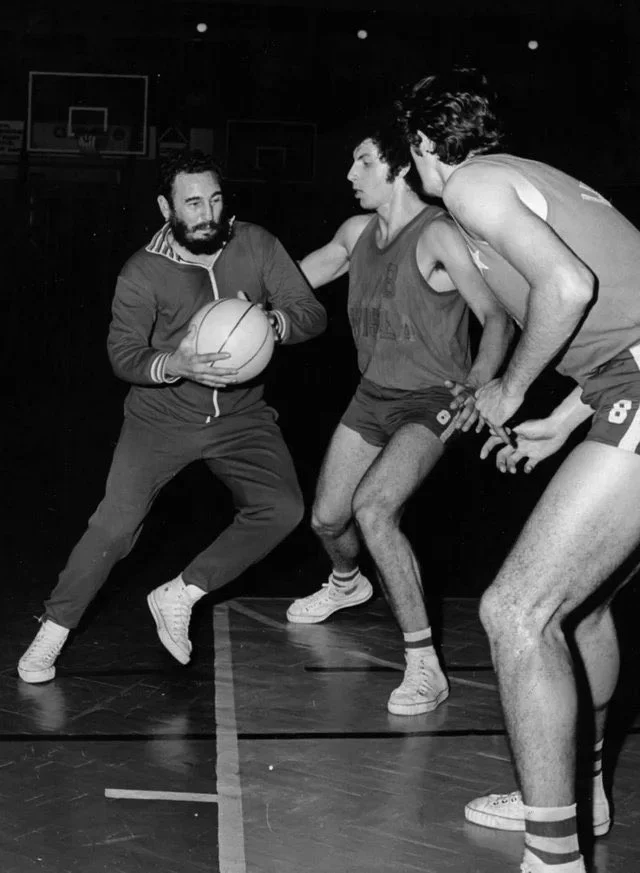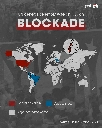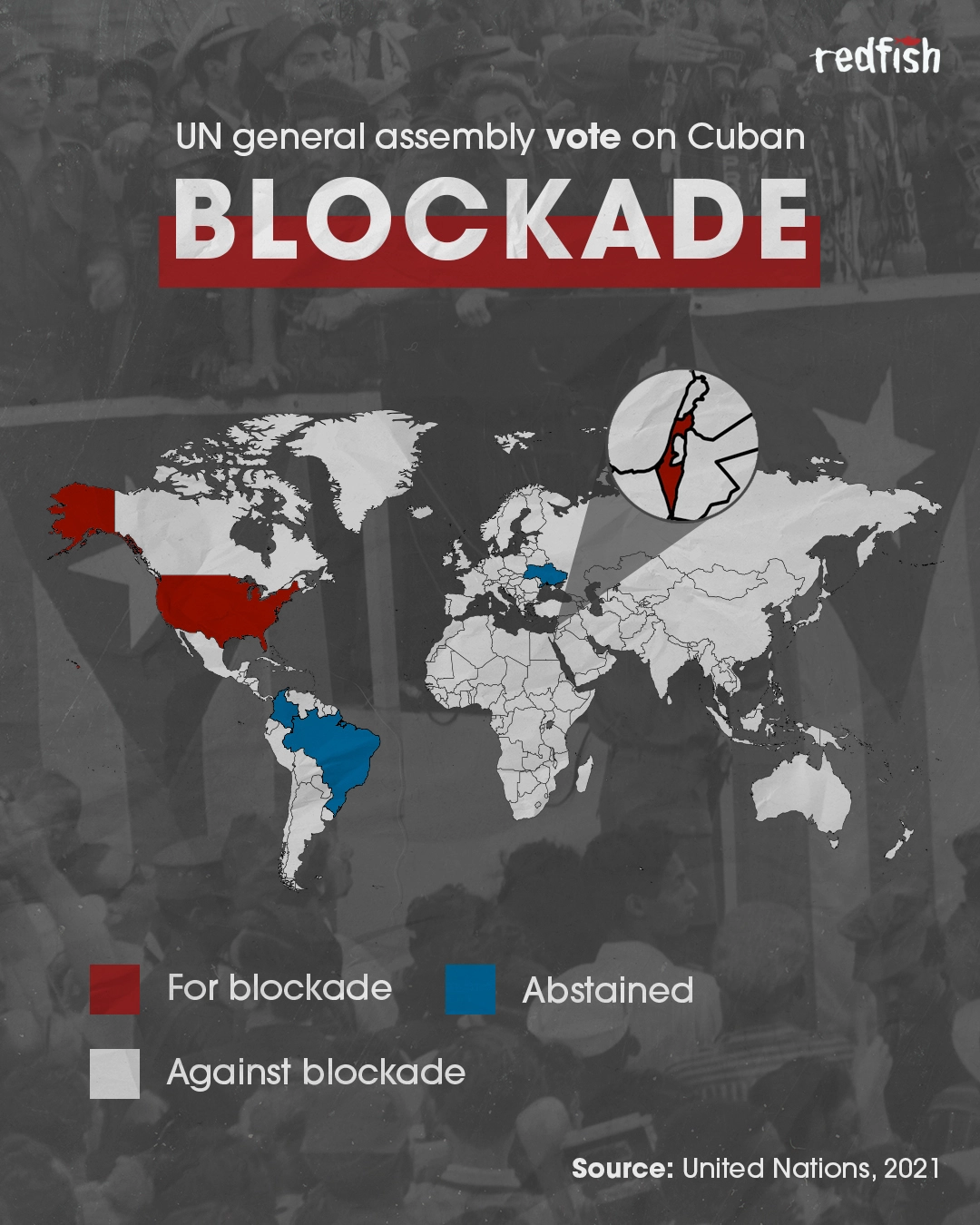Cuba
-
Comparison between treatment of severe mental illness in the U.S. and the Republic of Cuba
www.workers.org Treatment of severe mental illness in the U.S. and Cuba – a comparisonSue Harris is a psychologist who has worked in psychiatric hospitals and group homes and has been in private practice since 1968. She is co-author of “Interpersonal Psychoanalytic Theory for the 21st Century: Evolving Self,” published by Lexington Books, an imprint of Rowman and Littlefield.

>In socialist Cuba, it is a different story. There are enough doctors, nurses and other medical workers, psychiatrists and psychologists to cover the entire Cuban population. “The physician to citizen ratio in Cuba is the world’s highest, with 8 physicians to every 1,000 citizens, more than double the ratio of physicians to citizens in the U.S. (Gonzalez Mendez, 2005; Campion & Morrissey, 2015) > >In Cuba, “Mental and medical healthcare are free and fully integrated. Early diagnosis and intervention are standard, as each patient is known by their community doctor/nurse team from infancy through old age and by yearly home visits.” (“Learning about mental healthcare in today’s Cuba: An interview with the president of the Cuban society of psychology,” — Linz, Sheila J & Ruiz, Alexis Lorenzo, 2020) > >If informed by a family member of a psychiatric problem, an intervention in Cuba can occur early before the mental health problem becomes a crisis. Doctors and nurses have established relationships with their patients, and usually live in the same community with government-supported, rent-free housing to foster long-standing relationships (“Briefing on the Cuban Mental Health System,” Jeffrey Kleinberg, 2018). > >If the profit motive is removed, a “cure” for the dreaded mental ‘diseases’ of schizophrenia, paranoia, bipolar disorder or any of the diagnoses contained under the rubric of SMI is relatively simple and effective, as is demonstrated in Cuba. This occurs despite the crippling sanctions imposed by the United States.
- www.workers.org Cuban President Díaz-Canel on challenges facing developing countries
The inaugural session of the Summit of Heads of State and Government of the Group of 77 plus China was held in Havana, Cuba, Sept. 14 to 16. Established in 1964, the G77 now has 134 members, with a rotating chair alternating among member countries from Asia, Africa, the Middle East, Latin America an
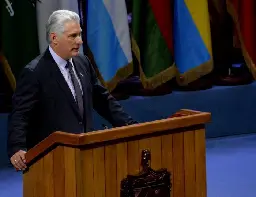
>Díaz-Canel stressed that, “It is necessary to remove the international barriers that have hindered access to knowledge by developing countries and their use of such determining factors for economic and social progress.”
-
‘Cuba will never renounce its socialist system of social justice’ — Speech by Cuban Ambassador to U.N.
www.workers.org ‘Cuba will never renounce its socialist system of social justice’ – Speech by Cuban Ambassador to U.N.New York City The following slightly edited talk was given by Ambassador Gerardo Peñalver, the Permanent Representative of Cuba at the United Nations and First Deputy Minister of Foreign Affairs, at a solidarity event held July 29 to commemorate the 70th anniversary of the assaults on the Moncada
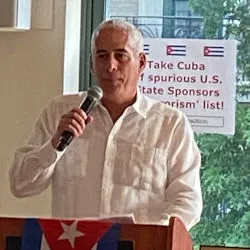
>We were able to offer to the world the solidarity that Washington did not give to the Cuban people with our medical brigades, in the worst moments of the pandemic. > >We are pleased that Cuba was able to successfully develop three homegrown COVID-19 vaccines, as well as immunize its pediatric population as of two years of age and vaccinate more than 90 percent of Cubans, in spite of the blockade. > >As is known, the government of Cuba has expressed its willingness to move towards a better understanding with the government of the United States and to foster civilized and cooperative relations, based on mutual respect and without prejudice to the sovereignty of the United States. > >We will continue to promote and facilitate the broadest possible ties with numerous sectors of this country that want to get closer to Cuba.
-
Pentagon denies that the PRC is developing a spy station in the Republic of Cuba
www.workers.org Corporate media slanders China, Cuba A lie so blatant even the Pentagon must deny itThe U.S. corporate media creates such unbelievable fabrications that sometimes the Pentagon and the U.S. war planners must reject them. Anyone who disbelieved Cuba and China’s denial of the Wall Street Journal’s charge that China paid Cuba billions of dollars for a spy base in Cuba was quickly prove
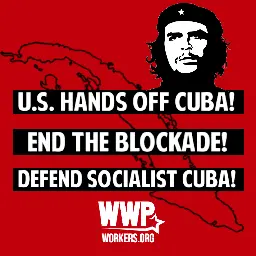
>Pentagon press secretary Brig. Gen. Patrick S. Ryder called the WSJ report “inaccurate” during a June 8 briefing. “We are not aware of China and Cuba developing any type of spy station,” said Ryder, adding that “the relationship that those two countries share is something that we continuously monitor.” (thehill.com, June 8) > >White House national security spokesman John F. Kirby then denied the WSJ story. “I’ve seen that press report. It’s not accurate,” Kirby told MSNBC. (June 8) How the media and the politicians handled the false report illustrated how the U.S. ruling class and its political system is geared to moving toward confrontation and war.
-
Amazon Labor Union’s Chris Smalls: ‘Worker solidarity doesn’t stop at the border’
www.workers.org ALU’s Chris Smalls: ‘Worker solidarity doesn’t stop at the border’By Chris Smalls On May Day, I joined a delegation of organizers on a trip to Cuba to show solidarity with the Cuban people and call out the injustice that is an economic blockade designed to harm workers and the people on the island. Let’s make one thing very clear: The blockade isn’t designed
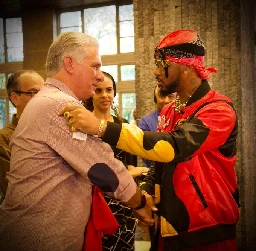
>Show solidarity with the workers of Cuba and all of the people who have suffered for literally no reason and join us in demanding an end to the blockade.
- www.workers.org Haydée Santamaría, central figure in the Cuban Revolution
In the early hours of July 26, 1953, Fidel Castro and nearly 150 Cuban rebels traveled to the Moncada garrison to capture the barracks and seize the many weapons stored there. They planned for this to be the beginning of the Cuban Revolution to overthrow the Cuban dictator, President Fulgencio Batis
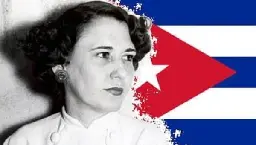
>Batista wanted Haydée Santamaría to divulge Fidel’s whereabouts. To force her to speak, the torturers showed her her brother’s eyes and Boris’ dismembered genitalia. This grotesque act of intimidation, however, did not break her revolutionary strength. She defied her own torturers and remained silent. “If you did that to them, and they didn’t talk, much less will I.” > >Santamaría wrote to her mother from prison: “Abel will always be with us. Cuba exists, and Fidel is alive to build the Cuba that Abel wanted.” She said, “Abel is not dead, for to die for your country is to live.” > >[…] > >Santamaría’s political convictions were based on experience, not just theory or pure logic. She saw that it was not enough to change one politician for another, that it became necessary to change systems in order to change humans. “Changeover had to be total. Then it had to be ours, absolutely ours. . . . For me, to be a Communist does not mean only joining a party; it means having an attitude towards life.”
-
Progressive Africa in solidarity with the Republic of Cuba
www.workers.org Progressive Africa in solidarity with CubaThis article was published in Avante, the weekly newspaper of the Portuguese Communist Party, on April 13. Translation: John Catalinotto. The South African Communist Party has reaffirmed its support for convening, later this year, an Africa-Cuba Solidarity Conference. According to the SACP, th

-
A comparison of mental health care: the United States & the Republic of Cuba
www.workers.org A comparison of mental health care: the United States and CubaThe writer is co-author of “Interpersonal Psychoanalytic Theory for the 21st Century: Evolving Self,” published by Lexington Books. She has been a practicing psychotherapist since 1968. Until the 1970s, psychiatric hospitals in the U.S. were huge, much like prisons, warehousing thousands of peopl
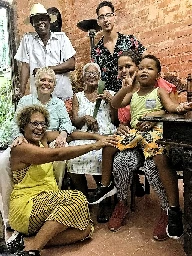
>The most important concept underlying mental health services in Cuba is the strength of the relationship between mental health care and Cuban society as a whole. Mental health care is completely integrated into Cuban society. The orientation of health care in general is preventive, through education and frequent contact, so that potential health problems are spotted early before they become serious. Psychologists and other mental health workers are included. > >Teams make regular visits to people in their sector, focusing especially on high-risk groups, such as children from birth to four years old, the elderly, people with diabetes and people with high blood pressure — all as part of an exercise of preventive medicine.
-
MIR cards, a payment system that defies the blockade against Cuba
Since March 13, Cuban banks have been accepting the Mir card issued in Russia, which allows cash withdrawals by converting rubles into Cuban pesos and favors transactions by tourists or businessmen from the Eurasian nation on the island.
Since March 13, Cuban banks have been accepting the MIR card, issued in Russia, which allows making cash withdrawals by converting rubles into Cuban pesos, and which favors transactions by tourists or businessmen from the Eurasian nation on the island. This payment system defies the criminal blockade imposed by the United States on Cuba for more than six decades, because it establishes links between financial organizations of the two countries, including third parties that use these gateways. The Russian agency Sputnik recently quoted the Russian ambassador to Havana, Andrei Guskov, who put forward these arguments and added that the implementation of this system should have a positive effect on the increase in the flow of Russian tourists to the island. Likewise, Professor Luis René Fernández Tabío, researcher at the Center for Research on International Economy of the University of Havana, said that "it is a contribution to the balance of payments, and with it the country can import goods and services from the Eurasian nation," in addition to protecting the bilateral link from the negative impact of the blockade. For Fernández Tabío it is also a window that contributes to break the direct and indirect effects of the economic war applied against Russia through Western sanctions, which prohibit the import and export of goods, services and technology. The Cuban expert explained that the MIR payment system constitutes a step outside the Swift system, and could favor the incorporation of Cuba to a method of transactions at the moment it becomes generalized, either within the BRICS (Brazil, Russia, India, China and South Africa) or other alternative mechanisms created to escape the predominance of the dollar and its entire system of unilateral coercive economic measures, illegal from any point of view and violators of human rights.
-
75.92% turnout in Cuba’s legislative elections
peoplesdispatch.org 75.92% turnout in Cuba’s legislative elections : Peoples DispatchThe newly elected members of the National Assembly will assume office on April 19, and the same day, will elect the new President and Vice President of Cuba
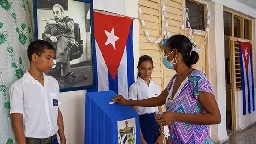
- www.workers.org Socialist Cuba and mosquitos: humanity calls, Cuba answers
Mosquito-carried disease vectors have plagued humanity for millennia. Mosquitos carry dengue, yellow fever, malaria, West Nile fever, Zika fever, several varieties of encephalitis, Rift Valley fever, Chikungunya and Lymphatic filariasis, as well as Dog heartworm. Aedes mosquitos transmit deng
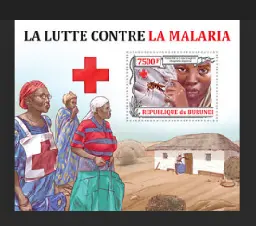
>In a March 2020 talk to the National Network on Cuba, University of Glasgow lecturer Dr. Helen Yaffe stated that Cuba initiated biotechnology five years before the first capitalist biotech company was established. Dr. Yaffe explained that Cuban biotech was nonprofit — based on collaboration, not competition — and is tied to their education system. > >“Cuba bet on biotechnology very early, opening the first research manufacturing facility in the country in 1981,” said Agustín Lage, founder and former director of BioCubaFarma’s Center of Molecular Immunology. “Those early steps set the stage for the sector’s current performance in Cuba — supplying over 60% of the country’s essential medicines list, exporting to more than 40 countries, registering innovative products, showing tangible impact in public health and owning more than 2,000 patent filings worldwide.”
- www.cubanews.acn.cu Mexico will Hire More Cuban Doctors
Havana, March 14 (ACN) The director of Mexico’s Institute of Social Security Zoe Robledo announce on Tuesday the increase in the hiring of Cuban doctors.
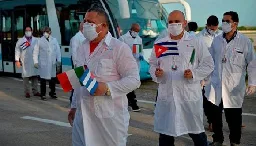
Havana, March 14 (ACN) The director of Mexico’s Institute of Social Security Zoe Robledo announce on Tuesday the increase in the hiring of Cuban doctors.
During a press conference given on Tuesday by President Andres Manuel Lopez Obrador, Robledo explained that the number of Cuban doctors to Mexico will double the nearly 600 specialists already working in that country, according to PL news agency.
In May 2022, Cuba and Mexico signed a health accord including the training of medical professionals, research, vaccines, drugs and the hiring of Cuban doctors by Mexico.
- www.cubanews.acn.cu Cuba marks Day of the Cuban Press
HAVANA, Cuba, Mar 14 (ACN) Cuban authorities and institutions congratulate today the country's media workers, on the occasion of the Press Day, which evokes the creation of the newspaper Patria, considered a paradigm of revolutionary journalism.
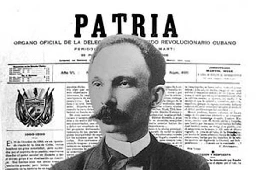
HAVANA, Cuba, Mar 14 (ACN) Cuban authorities and institutions congratulate today the country's media workers, on the occasion of the Press Day, which evokes the creation of the newspaper Patria, considered a paradigm of revolutionary journalism.
Miguel Diaz-Canel, First Secretary of the Central Committee of the Communist Party of Cuba (PCC) and President of the Republic, stressed that the national press, with ethics and truth as principles, honors every day the publication founded on March 14, 1892 by national hero Jose Marti.
On Twitter, the president wished happy day to the press professionals, and said that in Cuba that profession fights against inefficiency and brakes to development, while recognizing the effort and results.
Meanwhile, the President of the National Assembly of People's Power, Esteban Lazo, highlighted in his congratulations the loyalty of the press workers to Marti's legacy and their dedication to the homeland and the Cuban people.
For his part, Prime Minister Manuel Marrero said on the same social network that the professionals of the press sector exercise their work with passion and honor.
The journalists' guild closes today the day of celebrations for its day, with the closing of the 2nd International Colloquium Patria, the presentation of the Jose Marti and Juan Gualberto Gomez National Journalism Awards, and a political-cultural event on the steps of the University of Havana.
-
Mar. 11–12: International U.S.-Cuba Normalization Conference, in-person & virtual
www.us-cubanormalization.org Stand with Cuba - International US-Cuba Normalization Conference, NYCInternational US-Cuba Normalization conference at Fordham University, School of Law, New York City, March 11th -12th
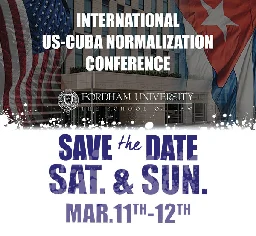
>March 11-12, Fordham University, NYC > ># International US-Cuba Normalization Conference > >An International Conference on US-Cuba Normalization will be held next weekend, March 11-12. The conference is an in-person event at Fordham University in New York City, but the Plenary sessions will also livestreamed. Pre-registration for the conference for in-person and virtual attendance is required, and can be done here. > >The conference is packed with events: > >Saturday, March 11: >* 9:15-11:45 am: Cuba solidarity short film festival >* 12:00 pm: Plenary session, featuring a keynote presentation by Noemi Rabaza Fernandez, First Vice-President, Cuban Institute of Friendship with the Peoples (ICAP) and a presentation on prospects for removing Cuba from the "State Sponsors of Terrorism" list >* 2:00-3:30 pm: Concurrent panels >* Cuba and the African diaspora, featuring presentations by Ambassador Yuri Gala Lopez – Deputy Permanent Representative, Cuban UN Mission and Professor Kenia Serrano, Dean of Preparatory School of Languages, University of Havana, Coordinator, Cuba in Africa Oral History Project >* Women's Rights in Cuba today, featuring three panelists from the Federacíon de Mujeres Cubanas (FMC) >* Cuba and Youth Solidarity >* Cuba and the Labor Movement >* 4:00-5:30: Concurrent panels >* Organizing the movement in the streets >* Resolutions and legislative outreach >* Solidarity travel >* 8:00-9:30 pm: Public rally featuring a message from the Cuban Ambassador to the United States, Lianys Torres Rivera > >Sunday, March 12 >* 9:30 am: Special film presentation >* 11:00-2:00 pm: Closing plenary > >Full details about the conference and all the speakers can be found on the conference website.
(Message courtesy of an email from the Cuba and Venezuela Solidarity Committee.)
- web.archive.org Cuba to host course on Marxist thought in Afro-America
Havana, Feb 28 (Prensa Latina) The Havana-based Casa de las Americas convened the International Summer Course on "Marxist Thought in Afro-America," which will take place from July 3 to July 7.
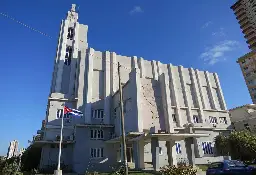
Havana, Feb 28 (Prensa Latina) The Havana-based Casa de las Americas convened the International Summer Course on "Marxist Thought in Afro-America," which will take place from July 3 to July 7.
The purpose of the course is to contribute to enriching the Marxist theoretical heritage, from Cuba’s experience in its struggle against slavery, colonial and neocolonial oppression, capitalist logic and imperialist domination, and its historic-cultural belonging to the Global South, according to Casa de las Americas.
The main thematic axes for debate will be Marxism, Pan-Africanism, feminism: affluences and confluences and Marxist apprehensions of social movements.
Participants will include professors from several countries, two daily lectures are planned for a total of 10, and book presentations and other events will be held in the evenings.
Up to 40 places will be granted, 20 for residents outside of Cuba and the same number for participants in person, and those interested can consult details on the official website of Casa de las Americas.
The call will be open from February 27 to April 30, and confirmation of enrollment and the course program will be published on May 10.
Casa de las Americas is a Cuban cultural institution founded in 1959 to defend sociocultural integration with Latin America, the Caribbean and the rest of the world.
It also disseminates artistic and literary materials from the region through promotional activities, courses, concerts, contests, exhibitions, festivals and seminars, among other initiatives.
- web.archive.org Cuba establishes new weather station
Ciego de Avila, Cuba, Feb 27 (Prensa Latina) An automatic weather station is being set up on Monday in the coastal town of Punta Alegre, in this central Cuban province, to reinforce the early warning system about hydrometeorological phenomena.
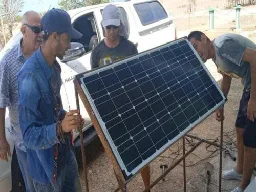
The deputy technical director of the Meteorological Center in Ciego de Avila, Aliana Lopez, said that the equipment will transmit data uninterruptedly, will provide information every 10 minutes, and can monitor atmospheric variables in real time.
The center is of great benefit for the community because it will measure temperature, rainfalls, relative humidity, wind speed and direction, cloudiness, atmospheric pressure, solar radiation, among other indicators, the specialist pointed out.
Included within the actions of the international Coastal Resilience project under development in Punta Alegre, the new equipment will strengthen the warning system on extreme meteorological phenomena and other effects of climate change, she added.
She emphasized that by providing a series of climate statistics, it will favor territorial development planning, mainly in agriculture and fishing, in addition to reducing losses and disasters caused by hurricanes, heavy rains, droughts and other phenomena derived from climate change.
The station is adjacent to the Los Buchillones Archaeological Site Research Center in Punta Alegre, in an area that meets indispensable requirements such as safety, leveling of the terrain and distance from natural or artificial elements that could distort the measuring of meteorological variables.
Funded by the European Union’s Global Climate Change Alliance and implemented by the United Nations Development Program, the international Coastal Resilience project aims to rehabilitate ecosystems to benefit the inhabitants of communities on the northern coast of the central region of the country.
It is also based on the search for natural solutions to adapt to climate change, such as planting mangroves and other native coastal plants.
Another purpose of the initiative is to strengthen and integrate disaster risk reduction at the local level and to adapt the socioeconomic development plans of sectors and the government of the town of Punta Alegre, where about 6,000 inhabitants live, to climate change.
-
Cuba on the way to having its own vaccine against the human papillomavirus
There have been many health problems for which Cuban science and the human and intellectual potential of the scientists, has found an effective and sovereign response in order to protect and improve the quality of life of the population.
This humanist premise is confirmed time and time again. The latest instance is the recent announcement of the project to create a vaccine against the human papillomavirus (HPV), led by the National Center for Scientific Research (CNIC in Spanish), together with other entities of the BioCubaFarma business group.
"Beyond the importance it could have for the institution, it is an opportunity to contribute to the solution of a health problem, such as the transmission of HPV, which is the cause of the appearance of tumors in women," said Julio Alfonso Rubí, PhD in Sciences and CNIC general director.
According to information from the center, cervical cancer -caused by persistent infection with a group of high-risk oncogenic HPVs- is one of the main causes of death in women.
There are more than 240 different types of HPV, of which 15 are related to cervical cancer, and other less common types such as vaginal, vulvar, anal, penile and oropharyngeal cancer.
Among the most dangerous are genotypes 16 and 18, which are linked by 70% to preneoplastic and invasive cervical cancer lesions globally.
In Cuba, cervical cancer is the fifth cause of death in women, and the second in the group between 15 and 44 years of age. Studies for the identification of HPV in different population groups, carried out by researchers of the Pedro Kourí Tropical Medicine Institute and other Cuban medical entities such as the Hermanos Ameijeiras Clinical and Surgical Hospital, showed a high frequency of infection by HPV genotypes of high oncogenic risk in Cuban women, even when they present a normal cytology test.
Precisely, genotypes 16 and 18 have been found among the most frequent in cervical cancer samples in Cuban women.
In view of the incidence and risk of this disease, the World Health Organization proposed a global strategy to eliminate it as a Public Health problem for the decade 2021-2030, which includes vaccinating 90% of girls under 15 years of age against HPV before 2030.
There are at least five HPV vaccines in the world that are prequalified; however, the prices of these vaccines, which patent is generally owned by large companies, are not accessible today to the economic possibilities of our country, Dr. Alfonso Rubí pointed out.
AT WHAT STAGE IS THE HPV VACCINE PROJECT?
Karen Marrero Domínguez, CNIC researcher in charge of the project, explained that the project aims at obtaining a bivalent vaccine candidate against HPV infection in genotypes 16 and 18.
The vaccine candidate under development is designed as a subunit vaccine, and uses as antigen the major envelope protein of HPV 16 and 18, called l1, she added.
"This protein, when produced in recombinant systems, has the property of self-assembling into particles, which morphologically and immunogenically resemble the envelopes of the virus itself. That is why they are called virus-like particles," she explained.
The researcher pointed out that all the vaccines developed to date use these nanostructures as the active ingredient, and have shown that they are capable of inducing an immune response that protects against infection by these viruses the person has been immunized.
Likewise, the immunogens approved to date include protection against genotypes 16 and 18, which together are responsible for 70% of the development of cervical cancer, which is why the Cuban project also employs them, she said.
Marrero Domínguez explained that the project has been divided into three stages. The first one constitutes the development and obtaining of the production systems; in our case, the Escherichia Coli bacteria is used as host, and the establishment of the protein purification conditions, and later the assembly of these virus-like particles from the purified proteins.
"The antigens are already structurally corrected at the laboratory. What’s next? The immunogenic evaluation, that is, the capacity of these structures to induce these responses in animal models," added the specialist.
The second stage of the project is to adapt the process of obtaining these particles, which have been developed in the laboratory, to a larger scale, , she pointed out. For this, we will work with the National Biopreparations Center in order to obtain larger quantities of these antigens, which will allow the development of the vaccine candidate in a formulation ready for testing.
“Our purpose is quite ambitious. We aim to have a vaccine candidate ready for testing in animals to evaluate the toxicology and immune response," said Marrero Domínguez.
In this sense, Dr. Alfonso Rubí explained that the results obtained thus far have made it possible to officially reporting on the development of a project with a high probability of success.
Regarding the importance of a future vaccine, the CNIC Director General stated that it is an opportunity to protect our female population from a fundamental health problem such as cervical cancer and other lesions associated with HPV infection.
He also stressed that the goal, although ambitious, is to vaccinate the female population between nine and 15 years of age by the year 2030.
IT IS ALSO A MATTER OF SOVEREIGNTY
"The HPV vaccine project transcends addressing a health problem; Cuba being the producer of the vaccine and having it available in our country is also a matter of security and sovereignty," said Dr. Alfonso Rubí.
The director pointed out that, in difficult circumstances such as the ones we are living, Cuba cannot count on any supplier nor on the possibilities of paying for any vaccine, so the country had to produce its own.
Precisely, the CNIC was the first multidisciplinary institution dedicated to biomedical and scientific research. Created by the Revolution on July 1, 1965; the CNIC is also the precursor of the development of the current Cuban biopharmaceutical industry.
Its Director General pointed out that the CNIC develops a wide research activity based, fundamentally, on obtaining products of natural origin, in addition to the improvement of equipment for rapid microbiological diagnosis and projects associated with the diagnosis of environmental corrosion and the elaboration of ozonized products.
The HPV vaccine project corresponds to the line of research and development of biological products, in which the processes for obtaining antigens for the development of vaccine candidates against infectious diseases are established.
As an alternative and response to the health urgency, the executive highlighted, research began since mid-2019for the development of a Cuban vaccine against HPV, which is advancing, with encouraging results, to become a vaccine candidate.
-
Hatuey Project Delivers 40,000 pounds of construction material to aid Cuba hurricane recovery
Over 40,000 pounds of construction material were delivered to the western Cuban province of Pinar del Río on Saturday by members of the U.S.-based HATUEY Project to support Cuban residents heavily impacted by Hurricane Ian last September. The HATUEY Project’s name (Health Advocates in Truth, Unity and Empathy) honors Hatuey, the Indigenous man who fought Spanish colonization and was burned at the stake in 1512 for his resistance. He is known as one of Cuba’s first heroes.
The HATUEY Project sent a 40-foot container by ship from Miami to Cuba that arrived on January 19. Thanks to generous donations of community groups and individuals from the United States, Puerto Rico, Australia and Germany, the donation included 18,000 pounds (500 panels) of 3’x12’ sheet metal roofing, 19,200 pounds of concrete, two 12,000 watt electrical generators, windows, plywood and tools – all essential products for home reconstruction.
Donations to HATUEY came from The People’s Forum, the ANSWER Coalition, Movimiento Nacional Hostosiano of Puerto Rico, the Mexico Solidarity Network, the Western Sydney (Australia) Committee in Solidarity with Cuba, and many individuals.
The group met with representatives of the local government and workers to learn about the ongoing recovery efforts in the region. Roughly 120,000 people were affected, with 60% of housing damaged. The electrical grid was downed completely. 11,000 tobacco curing houses were destroyed by the Category 4 storm. Cuba’s famed cigars are a major source of foreign income for Cuba. Nearly all food production was wiped out.
Pinar del Río is the westernmost region of Cuba, most famous for its tobacco production, with agriculture a close second. 48.3% of Pinar del Rio is covered in forests, and it is the largest producer of wood products in Cuba. It has the only factory for electronic components of solar panels in Cuba.
Residents in the hurricane’s direct path were evacuated, and three Cubans died. Comparatively, over 70 people died due to the same hurricane in Florida. Immediately following the storm, the National Defense Council of Cuba (NDC), provincial and municipal governments, together with the community, jumped into action. The NDC is headed by President Miguel Díaz-Canel to address national emergencies, provide resources and support to municipalities in recovery.
They held community discussions, surveyed neighborhoods with case workers to identify the most impacted, and helped to plan long-term recovery. In coming days, families who still need housing will receive for free the materials donated by HATUEY. Additionally, micro-, small-, and medium-sized private businesses (MIPYMES) are partnering with the government to work on the construction.
Within 35 days, the electricity was completely restored. Over the last six months, 25% of housing in Pinar del Río has been recovered, despite immense material shortages due to the U.S. blockade against Cuba. While 46 different entities around the world have sent donations of construction materials, including Mexico and Venezuela, Pinareños and Cubans from other provinces have been working hard to redesign houses with local materials and improve upon their former designs to withstand future hurricanes.
HATUEY coordinator Gloria La Riva explains, “We witnessed the tremendous collective spirit of the Cuban people, from the construction and warehouse workers as well as the communities, to overcome a storm that destroyed so much of the province. Our greatest responsibility is to continue fighting the U.S. blockade which is more harmful than any hurricane.”
In a neighborhood called El Calvario in the municipality of Pinar del Rio, professors Mikel Moreno and Jorge Luis Valla Soto of Havana University’s Heritage Preservation department are working with the university students, also from Havana, to build a new home for a mother and her six children. The unique double-domed Catalonian-inspired design utilizes local materials, such as brick, a special formula of cement, and local wood, to avoid dependence on more expensive materials such as steel. The design keeps the house cool during hot weather, and is built to withstand future hurricanes.
In another community of the township of Pinar del Río, we saw bathrooms being built with concrete brick to shelter from future hurricanes. Many families lost everything when entire houses were destroyed during Hurricane Ian. “In the reinforced bathroom, families will be able to shelter in place, or, if they have to evacuate, they will be able to leave their valuables in these rooms to stay protected,” explained Armando Izquierdo Valdez, construction brigade leader.
Cuban workers from other regions have made great sacrifices to support the people of Pinar del Río, coming from provinces and cities hours away, staying months at a time, and working long days.
“Cuba is an example we need to learn from in what is possible for our own future. Housing is essential to our physical and mental well-being, but in the United States it is viewed as separate. We see luxury apartments coming up overnight but public goods, like truly affordable housing, public libraries, and hospitals, take years to develop because the United States puts profits over people,” said Andira Alves of the HATUEY Project.
“The Cuban government and people have the will to repair the damage, but due to the criminal U.S. blockade, the resources fall short,” said Jake Tucker, a construction worker in San Antonio who came with the HATUEY Project to witness Cuba’s recovery. “The people of Cuba are progressing towards a full recovery for everyone affected. We came away with a greater understanding of how Cuba’s government and people work together to build their society.”
-
Laos and Cuba further strengthen friendship and cooperation
cross-posted from: https://lemmygrad.ml/post/517078
> In order to join efforts to improve people-to-people contacts and move towards a new level in bilateral relations in general, and in particular in the sphere that she attends to, the Lao minister urged to further foster the long-standing collaboration provided by Cuba to her country. > > The head of the Cuban diplomatic mission, for her part, expressed her satisfaction with the increase in cooperation in matters of labor and social security, and exchanged criteria with Khattiya about the ministry she heads. > > Viant also explained to her hostess the parliamentary electoral process in Cuba, which will culminate on March 26, and offered an exhaustive explanation about the composition, representativeness and level reached by the current candidates for deputies. > > In recent days, the Cuban ambassador paid courtesy visits to the general director of Lao National Television, Amkha Vongmeunka, and to the editor-in-chief of the Vientiane Times newspaper, Thonglor Duangsavanah. > > Last week, the member of the Central Committee of the Lao People’s Revolutionary Party and president of the Women’s Union, Inlavanh Keobouphanh, visited Cuba.
-
Cuba shows majority participation of women in Parliament
If the proposed candidates are elected on March 26, Cuba will maintain a milestone reached in 2018, since it will once again have the world’s second parliament with the largest number of women: accounting for 55.3 percent of all lawmakers of a total of 470 legislators.
The leading role of Cuban women is also evident in the country’s scientific and technological events, as more than 50 percent of its stockholders are women, as well as in the labor force, hence their parliamentary candidacies include representatives from all walks of society.
Women’s participation due to their merits and skills in Cuba’s Parliament has been increasing: in the 7th Legislature, which was in session from 2008 to 2013, they constituted 43.32 percent of the total number of its deputies, while in the 8th Legislature (2013 to 2018) that figure reached 48.86 percent.
In the 9th Legislature, which will cease its functions in 2023, 53.4 percent of women are women.
These figures are results of the existing policies to guarantee the development of women, expressed in the Constitution of the Republic of Cuba, and the promotion of initiatives to eliminate gender gaps.
The advances experienced in this matter in the last few decades are considered one of the most successful social phenomena that have occurred during the Cuban Revolution.
-
Cuba saves young man that US doctors considered "hopeless"
web.archive.org /save/https%3A%2F%2Fwww.plenglish.com%2Fnews%2F2023%2F02%2F20%2Fus-solidarity-project-supports-return-of-injured-young-man-to-cuba%2F
Washington, Feb 20 (Prensa Latina) The Puentes de Amor solidarity project contributed to the return to Cuba today of a young man from this country who emigrated to the United States a few months ago and was the victim of an accident.
According to the coordinator of the group, Carlos Lazo, the boy, after living for a time in the state of Texas with his brothers, “had the misfortune of suffering a catastrophic accident that left him immobile and unconscious for months.” In that demarcation he underwent surgery and was treated in a hospital, but specialists considered the patient hopeless because his chances of recovering and surviving are slim, the activist added on his official Facebook account.
Lazo said the young man’s mother, who lives in Cuba, as well as his brothers, contacted Puentes de Amor to help manage his repatriation, to see the possibility of him receiving medical attention on the island.
“After several days of long travel to Texas, where members of the project picked him up and transported him to the city of Miami, this afternoon, we just landed in Cuba with the boy,” the Cuban resident professor emphasized in his publication in Seattle.
The coordinator of the initiative conveyed his thanks to the American doctors who initially treated the injured man, to his brothers, who took care of him since he left the hospital, and to all the people who in one way or another made this reunification trip possible.
In turn, Lazo conveyed his gratitude to the authorities in Havana, the Department of Attention to Cubans Residing Abroad, and the Cuban embassy here, “for becoming aware of this case and facilitating the documentation and procedures quickly, as well as how to coordinate in Cuba the reception and medical attention of the patient”.
Every month Puentes de Amor convenes solidarity caravans that, among other demands, defend the family reunification program, the sending of remittances and trips to Cuba, affected by the more than 240 measures imposed during the mandate of Donald Trump (2017-2021) and that are still valid.
They also collect donations to buy products such as powdered milk and then bring them to pediatric hospitals, day care centers and nursing homes on the island.
The platform supports the growing network of solidarity with Havana within the United States, which demands that the Joe Biden administration return to the path of understanding between the two countries and demands that the economic, commercial and financial blockade imposed by Washington be lifted more than six years ago. decades.
-
DPRK Officials Pay Congratulatory Visit to Cuban Embassy
Pyongyang, December 31 (KCNA) -- Officials of the Foreign Ministry and the Ministry of External Economic Relations of the DPRK and the Korean Committee for Cultural Relations with Foreign Countries visited the Cuban embassy here on Dec. 30 on the occasion of the 64th anniversary of the victory of the Cuban revolution.
Floral baskets in the names of the Foreign Ministry, the Ministry of External Economic Relations and the Korean Committee for Cultural Relations with Foreign Countries were laid before the portraits of President Kim Il Sung, Chairman Kim Jong Il, Comrade Fidel Castro Ruz and Comrade Raul Castro Ruz at the embassy. -0-
-
Did you know that Fox News once blurred out pro-Cuba slogans in the footage of a rally in 2021?
www.rt.com Fox News mocked for blurring pro-government slogans in footage of Havana rally shown alongside fiery Ted Cruz tiradeAs Ted Cruz praised the bravery of anti-government protesters in Cuba on Fox News on Tuesday, little did he know that the channel was showing footage from a pro-government rally in Havana alongside his remarks.
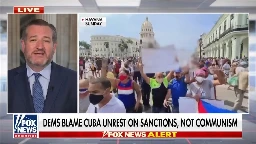
cross-posted from: https://lemmygrad.ml/post/428989
> ! > > > Some eagle-eyed viewers caught the inconsistency. The same footage – but with the slogans clearly visible – can be seen, for example, in a Deutsche Welle report on the situation in Cuba. Demonstrators declaring that “the streets belong to the revolutionaries” are probably not the kind of Cuban protesters that Senator Cruz had in mind.
- www.plenglish.com Iran calls for the end of U.S. blockade against Cuba
Tehran, Nov 6 (Prensa Latina) The Group of Friends in Defense of the UN Charter called for the U.S. government to put an immediate and unconditional end to its hostile blockade against Cuba, diplomatic sources informed Sunday.
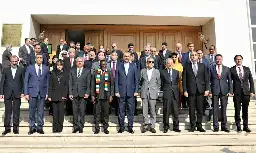
Tehran, Nov 6 (Prensa Latina) The Group of Friends in Defense of the UN Charter called for the U.S. government to put an immediate and unconditional end to its hostile blockade against Cuba, diplomatic sources informed Sunday.
According to a report from the Cuban embassy in Iran, the member states expressed their unwavering solidarity with the Cuban people and government.
The final text stressed that Cuba has heroically endured the negative impact of the economic, commercial and financial blockade imposed by Washington for over 60 years, which represents a major disadvantage to its full economic and social development.
The declaration signed by the 19 countries members of the Group of Friends in Defense of the UN Charter also supports the resolution passed by the UN General Assembly (UNGA) on November 3, calling for the pressing need to put an end to this genocidal policy unilaterally imposed by the White House on Havana.
The meeting was held on Saturday in Tehran and attended by the Iranian Foreign Minister Hosein Amir Abdolahian, deputy ministers, ambassadors, special representatives and advisors of the guest States.
-
Invisibilizing the Cuban media?
A dozen Cuban media and people who share their news and political position have been marked on Twitter or blocked on Facebook in the last two days, as part of a mechanism, previously used in both networks, to make content related to political processes invisible.
-
Our lives depend on it
Although the conditions are not in place for values to flourish as we would like them to, neither is it an option for indifference to prevail.
-
Overwhelming victory for Cuba at the UN: 185 countries vote against the blockade
Cuba celebrates Thursday a new victory in its struggle against the U.S. blockade, by achieving overwhelming support in the United Nations General Assembly (UNGA) for a resolution approved by 185 votes in favor, two against and two abstentions
-
Hurricane Ian caused massive damage to Cuba — Let’s all help Cuba’s recovery!
>Hurricane Ian has devastated Cuba’s western provinces of Pinar del Río, Mayabeque and Artemisa. All of Cuba was without electrical power for two days. For six hours the hurricane passed slowly over Cuba, causing unprecedented destruction of thousands of homes and the region’s agriculture, and creating major flooding in Havana. Fortunately, Cuba’s evacuation of the people minimized losses to three people who died. > >Cuba needs massive help to recover! The ANSWER Coalition and the Hatuey Project appeal to you to help Cuba in their time of need. Please make a donation today, so we can send urgently needed medicines and other essential needs to Cuba as soon as possible. > >Electrical workers across the island are struggling mightily to restore power, and the people are working hard in the recovery. > >The will and determination of the Cuban people to recover is strong. What they lack is resources, due to the U.S. economic blockade and 243 added measures signed by President Trump. Those measures have not been lifted by President Biden. > >When a massive oil depot fire hit Cuba in late August, we asked for help. You responded with almost $20,000 worth of donations. We immediately delivered that medical aid to help the burn victims of the fire. > >When we asked, you responded. Today we appeal to you again. > >The U.S. blockade of 60 years harms Cuba greatly. Recently, the U.S. added one more blow in its vicious assault on the Cuban Revolution — designating Cuba as a "state sponsor of terror." This utterly false label presents a major obstacle to Cuba's ability to trade with the world and to purchase needed supplies. Your help to provide those supplies is absolutely essential. We ask you to donate what you can immediately because, as we did with our response to the Matanzas fire, we will rush supplies that we purchase to Cuba as soon as possible. All donations are tax-deductible. > >Donate > >On behalf of The Hatuey Project, we thank you in advance for whatever help you can offer in Cuba's latest time of need. > >Brian Becker, Executive Director, ANSWER Coalition >Gloria La Riva, coordinator, Hatuey Project >Nadia Marsh, MD, Assoc. Prof. of Clinical Medicine >Simon Ma, MD, MPH, Family Medicine >Leni Villagómez Reeves, MD >Rachel Viqueira, MHS, Epidemiologist
(Copied from an email from The Hatuey Project.)
-
Cubans vote on Family Code that protects human dignity
www.workers.org Cubans vote on Family Code that ‘protects human dignity’The Cuban people will vote in a Sept. 25 referendum on a new Family Code, which, if approved, would expand women’s and LGBT+ rights, as well as the concept of the nuclear family. Cubans living outside the country voted on Sept. 18. The new Code would legalize same-sex marriage, allow same-sex

>The new Code would legalize same-sex marriage, allow same-sex couples to adopt children, promote equal sharing of domestic responsibilities and extend labor rights (including pay) for those who care full-time for children, the elderly and people with disabilities. It would further confirm the right to free abortion, paid family leave and assisted and surrogate pregnancies (but not for profit), and it would fight gender-based violence and expand the rights of children and grandparents.
-
Any suggestions for understanding Cuban History?
What are some good documentaries to check out? What somewhat-short books are good? I’d like to learn about the Martí to Castro period specifically, but anything you can send is wonderful. Thanks
- www.answercoalition.org Activists land in Cuba with emergency medicine delivery
Act Now to Stop War & End Racism

The following is a dispatch that the ANSWER Coalition emailed to me:
>! > >Dr. Leni Villagómez Reeves, left, Gloria La Riva, Hatuey coordinator, center, Susana Llovet, Cuban Red Cross, second from right > >Dear Friends, > >On Friday, August 26, The Hatuey Project and ANSWER Coalition successfully delivered a shipment of medicines and equipment to help in the treatment of the people who suffered serious burns in the massive Supertanker oil fire in Matanzas, Cuba. Four tanks carrying millions of gallons of fuel were consumed by flames after a lightning strike, starting August 5. Hundreds of people were burned. Tragically, 14 firefighters died fighting the fire. > >As soon as the giant fire became news, ANSWER and the Hatuey Project issued an emergency appeal for donations, together with other solidarity organizations anxious to extend material solidarity to Cuba. Venezuela and Mexico sent firefighters. Other countries have also offered substantial help. Dr. Nadia Marsh, a member of ANSWER, arrived in Cuba to join the delegation. Dr. Marsh and Dr. Villagómez Reeves provided the medical advice for the shipment and rallied colleagues to join the effort. Many supporters of ANSWER and Hatuey heard the call and donated to make this aid possible. > ># donate now > >Arriving at the José Martí International Airport in Havana, Dr. Leni Villagómez Reeves and Gloria La Riva were met by officials of the Cuban Red Cross, the Ministry of Health, Medicuba and the Cuban Institute of Friendship with the Peoples, to receive the shipment. The Cuban Red Cross is the official recipient to work in the immediate distribution of the goods for the burn patients. > >Among the medicines and equipment are 360 bags of Lactated Ringer's Injection solution, 750 IV administration sets, 600 20g IV needle/catheters, 600 18g IV needle/catheters, 110 vials of Piperacillin/tazobactam antibiotics, 6,000 pairs of surgical gloves, 4 pounds of Mafenid ointment for more complex burns, 150 tubes Bacitracin, burn gauzes and rolls. Part of an earlier donation of Benadryl and vitamins by Hatuey were also directed for those patients. > >! > >Dr. Daymí Martínez Naranjo, director of Faustino Pérez Hospital in Matanzas; Dr. Maximiliano Prieto Gutiérrez, first grade specialist plastic surgeon; chief nurse Yadarí Calzadilla Delgado; Gloria La Riva; Dr. Elena Robaina Rodríguez, hospital vice-director. Dr. Prieto and Nurse Calzadilla are heading the patients' recovery efforts.
-
Any good books on Cuba to check out?
cross-posted from: https://lemmygrad.ml/post/368856
> I’ve been watching the Documentary that’s on Netflix “Cuba and the Cameraman” and there’s some great footage, I think it portrays Cuba and its struggles accurately, and also Fidel is an absolute Chad in the doc. I’d like to read about Communist-led Cuba primarily, but anything related to Martí or other prior class struggles are interesting to me also. Thank you in advance, I love Cuba so much for their medical help around the world, I wanna know more about them.
- www.workers.org Fighting fire with solidarity
These are especially bitter days to be living in the United States for those of us who are communists, socialists, progressives, even those remotely left of center. The killing of Roe v. Wade and the state subjection of women and anyone who can get pregnant to the role of breeding animals. Th...

>The failure of old equipment, the lack of access to replacement equipment, the squeeze on the nation’s economy and the difficulty in acquiring replacement fuel — all of these problems are the direct result of the infamous economic war the U.S. has waged against Cuba since 1961 — a blockade that continues to this day. > >But because of Cuba’s principle of “solidarity not charity,” which has sent hundreds of medical missions and assistance to other countries against the depredations of imperialism, Cuba will get the help it needs after the calamitous fire. > >Venezuela’s President Nicolás Maduro said, as he pledged to help rebuild the damaged terminal: “Cuba knows that it can count on our scientific, technical, engineering and worker support.” Maduro affirmed Cuba would always have “the support of the peoples of the world and of the compassionate, courageous and human-centered governments.” (telesurenglish.net, Aug. 17) > >Mexico sent firefighters; the Dominican Republic sent 40 tons of medical aid, and Russia sent a tanker with 700,000 barrels of crude oil, the equivalent of half of what Cuba lost. > >Many U.S.-based organizations, including IFCO/Pastors for Peace, Puentes de Amor and Code Pink sent solidarity. Workers World Party raised funds to send to Cuba to be used for medical supplies for those injured in the catastrophic fire.
-
Urgent appeal to help the victims of catastrophic fire in Cuba


>The ANSWER Coalition is forwarding this appeal from the Hatuey Project, a newly-formed medical aid project of health providers and social justice activists concerned about the harmful effects of the U.S. economic blockade of Cuba. > >As you may have already read, in Cuba's Matanzas province a massive fire has engulfed huge oil storage tanks at the Supertanker Base, carrying tens of thousands of cubic meters of fuel each. The fire began with a lightning strike Friday in this province east of Havana, and spread to a second and third major tank on Sunday. It created massive smoke plumes and is still not under control. > >Tragically, 16 firefighters are missing and one is dead. Dozens of people are burned, many with second and third degree burns. > >We deeply lament the loss of the first missing firefighter found, Juan Carlos Santana Garrido, as well as the disappearance of 16 other firefighters, and the injuries sustained by more than 120 people. We extend our heartfelt solidarity with the people of Cuba. > >Critical medical aid is needed. We are urgently appealing for your help. > >The Hatuey Project is working to provide some of the most critical supplies for burn patients: Special ointments and gauzes, specialized intravenous solution, syringes/needles, antibiotics, surgical gloves and much more. We are applying for an export license that is required for some of the items. Here's how you can help: > >Make a monetary donation so we can buy the supplies below in bulk. These are the most urgent items needed to save the lives of the burn victims. > >* Lactated Ringers IV fluid, $225, 24 per case, 500ml >* Continuous Flow Injection Set for IV, 48 per case, $299.50 >* Tetanus vaccine, $34.15 per dose >* Syringes with needle, $21.99 per 50 >* Piperacillen/Zosyn IV, $394.29 per 1,200 ml >* Silvadene cream ointment, $8.40 per 20 grams >* Bacitracin cream ointment, $2.16 per ounce >* Burn gauze, $9.63 per 4" pad >* Nitrile exam gloves, $5.75 per 100 gloves > >We will deliver the first shipments this week by plane and will continue until the need is fully met. > >Cuba has been through so much during the time of pandemic. Despite a heroic and successful campaign to vaccinate virtually all of Cuba from COVID, this summer has been particularly taxing for the whole country. Due to the U.S. blockade, major parts for electrical plants are lacking and they are in dire need of repair. The U.S. government has also blocked oil shipments from Venezuela from reaching Cuba. This has created an extreme shortage of fuel for transport and to run the thermoelectrical plants. > >The people of the United States have extended material solidarity to the people of Cuba many times. This is now that time again. > >Please click here to make a donation to The Hatuey Project. All proceeds will go to the material aid. Every donation to Hatuey is tax-deductible, through our fiscal sponsor, The Alliance for Global Justice. > >On behalf of The Hatuey Project, we thank you. > >Nadia Marsh, MD, Assoc. Prof. of Clinical Medicine >Simon Ma, MD, MPH, Family Medicine >Rachel Viqueira, MHS, Epidemiologist >Brian Becker, Executive Director, ANSWER Coalition >Gloria La Riva, coordinator, Hatuey Project
(Emphasis original. Photo credit: Vladimir Zayas/Bohemia magazine)
- www.plenglish.com Cuba reaffirms solidarity with people of Western Sahara
United Nations, Jun 14 (Prensa Latina) Cuba has reaffirmed to the United Nations its solidarity with the people of Western Sahara and supported their right to self-determination, for which they are currently fighting in that African region.
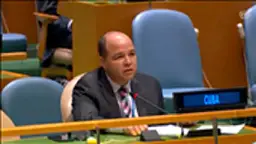
I'm just learning about this issue more.

